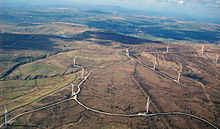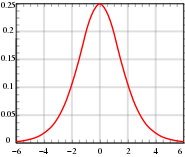
Back بوابة:طاقة Arabic Портал:Енергетика Bulgarian প্রবেশদ্বার:শক্তি Bengali/Bangla Portal:Energia Catalan دەروازە:وزە CKB Portal:Energie German Portal:Energía Spanish درگاه:انرژی Persian Teemasivu:Energia Finnish Portail:Énergie French
| Main page | New articles & Tasks |
 The Energy Portal Welcome to Wikipedia's Energy portal, your gateway to energy. This portal is aimed at giving you access to all energy related topics in all of its forms.
|
Page contents: Selected article • Selected image • Selected biography • Did you know? • General images • Quotations • Related portals • Wikiprojects • Major topics • Categories • Help • Associated Wikimedia |
Introduction
In physics, energy (from Ancient Greek ἐνέργεια (enérgeia) 'activity') is the quantitative property that is transferred to a body or to a physical system, recognizable in the performance of work and in the form of heat and light. Energy is a conserved quantity—the law of conservation of energy states that energy can be converted in form, but not created or destroyed; matter and energy may also be converted to one another. The unit of measurement for energy in the International System of Units (SI) is the joule (J).
Common forms of energy include the kinetic energy of a moving object, the potential energy stored by an object (for instance due to its position in a field), the elastic energy stored in a solid object, chemical energy associated with chemical reactions, the radiant energy carried by electromagnetic radiation, and the internal energy contained within a thermodynamic system. All living organisms constantly take in and release energy.
Due to mass–energy equivalence, any object that has mass when stationary (called rest mass) also has an equivalent amount of energy whose form is called rest energy, and any additional energy (of any form) acquired by the object above that rest energy will increase the object's total mass just as it increases its total energy.
Human civilization requires energy to function, which it gets from energy resources such as fossil fuels, nuclear fuel, or renewable energy. The Earth's climate and ecosystems processes are driven by the energy the planet receives from the Sun (although a small amount is also contributed by geothermal energy). (Full article...)
Selected article
Scout Moor Wind Farm is the second largest onshore wind farm in England. The wind farm, which was built for Peel Wind Power Ltd, produces electricity from 26 Nordex N80 wind turbines. It has a total nameplate capacity of 65 MW of electricity, providing 154,000 MW·h per year; enough to serve the average needs of 40,000 homes. The site occupies 1,347 acres (545 ha) of open moorland between Edenfield, Rawtenstall and Rochdale, and is split between the Metropolitan Borough of Rochdale in northern Greater Manchester and the Borough of Rossendale in south-eastern Lancashire. The turbines are visible from as far away as south Manchester, 15–20 miles (24–32 km) away.
A protest group was formed to resist the proposed construction, and attracted support from the botanist and environmental campaigner David Bellamy. Despite the opposition, planning permission was granted in 2005 and construction began in 2007. Although work on the project was hampered by harsh weather, difficult terrain, and previous mining activity, the wind farm was officially opened on 25 September 2008 after "years of controversy", at a cost of £50 million. (Full article...)
Selected image

Photo credit: Björn Appel
A solar furnace can be used to generate electricity, melt steel or make hydrogen fuel.
Did you know?
- During World War I, the German Army produced shale oil from Yarmouk oil shale deposits in Jordan to operate the Hijazi Railway (pictured)?
- Dennis Spurgeon, formerly chief operating officer at uranium supplier USEC Inc., became the United States Assistant Secretary for Nuclear Energy in 2006?
- Japan Canada Oil Sands Limited was the first offshore oil company to exploit the Athabasca oil sands in Canada?
- Teesside Power Station is the largest combined-cycle gas turbine (CCGT) plant in Europe.?
- The Klaipėda Geothermal Demonstration Plant in Lithuania was the first geothermal plant in the Baltic Sea region?
- Hitachi Zosen Corporation built the first oil tanker in Japan in 1908 per an order by Standard Oil Company?
- Coalbed methane is a form of natural gas extracted from coal beds?
- When constructed in 1906, the Baku–Batumi pipeline was the world's longest kerosene pipeline?
Selected biography
Born in Texas, Hubbert studied geology, mathematics, and physics at the University of Chicago. He pursued his Ph.D. while working for the Amerada Petroleum Company, then worked for the Shell Oil Company from 1943 until 1964. On leaving Shell he became a senior research geophysicist for the United States Geological Survey until retiring in 1976. Hubbert was also a professor at Stanford University and at UC Berkeley.
Hubbert is most well-known for his studies on the capacities of oil fields and natural gas reserves. He predicted that, for any given geographical area, the rate of petroleum production over time would resemble a bell curve. At the 1956 meeting of the American Petroleum Institute, Hubbert predicted that United States petroleum production would peak in the late 1960s or early 1970s. He became famous when his prediction came true in 1970.
In 1974, Hubbert projected that global oil production would peak in 1995 "if current trends continue". Various subsequent predictions have been made by others as trends have fluctuated in the intervening years. Hubbert's theory, and its implications for the world economy, remain controversial.
In the news
- 22 June 2024 – Russian invasion of Ukraine
- Russia launches missile and drone strikes across Ukraine, injuring two people and damaging energy infrastructure. Ukraine says that it shot down 12 of 16 missiles and all 13 drones. (Reuters)
- 16 June 2024 – Russian invasion of Ukraine
- Norway announces that it will give Ukraine 1.1 billion kroner (US$103 million) to help repair its energy infrastructure and secure the country's electricity supply before the winter. (Le Monde)
- 15 June 2024 – Russian invasion of Ukraine
- The United States announces a $1.5 billion aid package to Ukraine, focused primarily on the country's energy industry and humanitarian assistance. (Politico)
- 1 June 2024 – Russian invasion of Ukraine
- Russia launches missile and drone strikes across Ukraine, injuring at least four people and damaging critical infrastructure, including energy facilities. Ukraine says that it shot down 35 of 53 missiles and 46 of 47 drones. (Reuters)
General images
Quotations
- "We must not waste time and energy disputing the IPCC's report or debating the right machinery for making progress. The International Panel's work should be taken as our sign post: and the United Nations Environment Programme and the World Meteorological Organisation as the principal vehicles for reaching our destination." – Margaret Thatcher, 1990
- "The Kyoto treaty would have wrecked our economy, if I can be blunt." – George W. Bush, 2005
- "We strongly believe that the efforts needed to combat climate change do not have to be regarded as constraints on the economy. Instead, they can be used as a lever for new, green technology." – Maud Olofsson, 2007
Related portals
WikiProjects
WikiProjects connected with energy:
Other WikiProjects that may be of interest:
Major topics
Major categories
National energy supply, use & conservation
National electricity sector
Politics, economics, environment
- Climate change
- Energy conservation
- Energy economics
- Energy crises
- Energy development
- Energy policy
- Peak oil
Energy sources
- Fuels
- Biofuels
- Fossil fuels
- Fusion power
- Nuclear technology
- Renewable energy
- Energy conversion
- Electric power
- Energy storage
Energy-related design
Scientific usage
Help

Puzzled by energy?
Can't answer your question?
Don't understand the answer?
- Ask at the reference desk
- Read the Wikipedia help pages
For further ideas, to leave a comment, or to learn how you can help improve and update this portal, see the talk page.
Associated Wikimedia
The following Wikimedia Foundation sister projects provide more on this subject:
-
Commons
Free media repository -
Wikibooks
Free textbooks and manuals -
Wikidata
Free knowledge base -
Wikinews
Free-content news -
Wikiquote
Collection of quotations -
Wikisource
Free-content library -
Wikiversity
Free learning tools -
Wiktionary
Dictionary and thesaurus
© MMXXIII Rich X Search. We shall prevail. All rights reserved. Rich X Search




























































































































































































